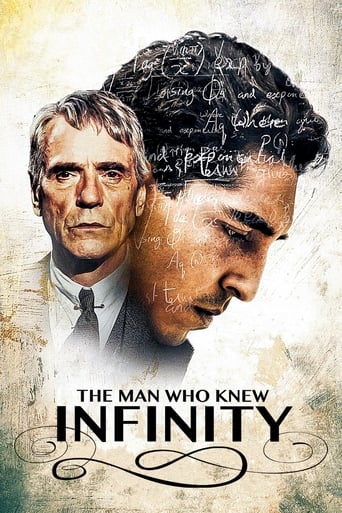

The Man Who Knew Infinity - Although the scientist-as-superhero film genre is more than well-established by now through A Beautiful Mind, The Imitation Game and The Theory of Everything, This biopic of Srinivasa Ramanujan warrants a watch for the pure genius the leading man epitomized. A Fellow of the Royal Society and also Fellow of Trinity College - monumental attainments for an Indian with no formal training in mathematics - tips of the iceberg for the genius that Srinivasa Ramanujan was, the movie tries to capture his liaison with renowned mathematician G.H.Hardy and his life at the Cambridge university.The movie scores in its accurate rendering of the intellectual mathematics involved and the realities of academic antagonism; the historical and cultural skirmishes between Indian and English conducts and the side track of jingoists vs. pacifists. A Tamil movie with the same topic - Ramanujan was released one year earlier which dispensed more with the personal life and enlargement of the virtuoso.Having said that, Dev Patel was an out-and-out miscast for the role, given Ramanujan's short and stout physique and his Dravidian guises. Patel is sure a strange casting choice yet captures his appeal with integrity and passion and in some means, a heftier underdog akin to his breakout role in Slumdog Millionaire.Biopics in our country have apportioned mostly with sportsmen (Bhaag Milkha Bhaag, M.S.Dhoni, Mary Kom, Dangal, Paan Singh Tomar, Azhar) while undermining the scientists and intellectuals - it's a pity that we are still relishing on screen versions of delinquents like Gujarati Bootlegger Abdul Latif (Read Raees !) while the west is adapting our finer lives to silver screen !
... View MoreConsidering the fact that I am a distant relative of the great Srinivasa Ramanujam,I really can't express extent of the justice which was done to him through this film.it is greatness like this which can is indefinable,it's a country like ours which mostly goes unrecognized owing to the great miraculous things we have achieved.this is a tale to tell and I am proud to be belonging to a country where this legend took breath.my family is very proud to have this movie about this esteemed countrymen of ours.my aunt showed me a picture of the hut he was living in,I couldn't help but breakdown considering such a genius from such simple backgrounds.always it's the people whom no one expects anything of ,who do things that no one can imagine and I am destined to live in an era of such great people.thank you God.
... View MorePure mathematics might seem too abstract a subject to translate easily to the cinema screen, but recent years have seen three major Hollywood films about mathematicians, "Good Will Hunting", "A Beautiful Mind" and "Proof". "The Man Who Knew Infinity" is a British film on a similar subject. Like "A Beautiful Mind" it is a filmed biography of a real-life mathematician, in this case the Indian Srinivasa Ramanujan.The action takes place in the early twentieth century. Ramanujan, originally from a humble background, is able to obtain a job as an accountant in the city of Madras because of his mathematical skills. It soon becomes apparent, however, that his skills are of a far higher order than those normally required for accountancy and that he is capable of understanding complex mathematical problems. Ramanujan writes to Harold Hardy, a mathematics don at Trinity College Cambridge, who realises that the young man is something exceptional and who invites him to study at Cambridge.Ramanujan takes up that invitation, but he does not find life in Cambridge easy. He is forced to leave his young wife Janaki in Madras, and the prospect of her joining him becomes even more remote when World War breaks out shortly after his arrival in England. He is the subject of racial bigotry, not only from local people- he is beaten up by a group of soldiers- but even from within the academic community. One mathematics don verbally abuses him, calling him a "wog" to his face, and although the other members of the faculty are more careful not to give vent to their prejudices so openly, it is clear that race is the main reason which prevents Ramanujan from being elected a Fellow of the College. He also suffers from health problems brought on by the cold climate. (Cambridge can be notoriously cold in winter; the flat East Anglian landscape means that it is exposed to every icy wind coming off the North Sea).Although Ramanujan and Hardy become friends, their relationship is not always an easy one, largely because their attitudes to mathematics are very different. Ramanujan is able to develop brilliant mathematical theories by intuition, but struggles with developing the rigorous proofs which are needed to test those theories and which Hardy insists upon. Their differing attitudes to mathematics are grounded in very different attitudes to life. Hardy is an atheist who will not accept the truth of any proposition, whether it relates to mathematics or anything else, which cannot be proved by logic or experiment. Ramanujan is a devout Hindu who believes that his mathematical insights come to him via divine inspiration and that any equation is meaningless unless it expresses a thought in the mind of God.Period dramas are ten-a-penny in the modern British cinema, but this is a good one. The London Mathematical Society said that it outshines "Good Will Hunting" in almost every way. Actually, that is probably not difficult, as I found "Good Will Hunting" a horribly overrated film, deeply disappointing in almost every way except for a fine performance from the late Robin Williams. I would also, however, rate "The Man Who Knew Infinity" higher than either "A Beautiful Mind" or "Proof", largely because of two excellent performances in the leading roles, from Dev Patel as Ramanujan and Jeremy Irons as Hardy. In reality Hardy was only ten years older than Ramanujan, but here the age difference is much greater, and at times their relationship is almost that of father and son rather than teacher and pupil. Or perhaps one could say that their relationship is not only that of teacher and pupil but also that of pupil and teacher, because Hardy comes to realise that he has as much to learn from the younger man- about life as well as about mathematics- as vice versa.I said at the beginning of this review that pure mathematics is an abstract subject, but you don't need to be a mathematical expert- and I am far from being one- to appreciate this film. The reason is that here it is not an abstract subject at all. It becomes a metaphor for life. We may not all know much about maths. We all know something about life. 8/10
... View More'THE MAN WHO KNEW INFINITY': Three Stars (Out of Five)A British biopic about a brilliant mathematician from India, named Srinivasa Ramanujan, who made history in mathematical theories, during World War I. The film stars Dev Patel, Jeremy Irons, Devika Bhise and Toby Jones. It was directed and written by Matthew Brown, and it's based on the book, of the same name, by Robert Kanigel. The movie performed decently in indie theaters, at the Box Office, and it's received mixed reviews from critics. I thought it was OK. The story begins at the turn of the twentieth century, when Srinivasa Ramanujan (Patel) was extremely poor, and still living in Madras, India. His exceptional mathematical skills became very useful to his employers there, who began using him for multiple accounting jobs. They later encouraged him to go to college. A well known mathematician, at Cambridge University, named G.H. Hardy (Patel), then heard about Srinivasa (and he became very impressed by what he heard), so he invited him to come study under him. Srinivasa took him up on the offer, while he also married his girlfriend (Bhise), and he later became a renowned expert in mathematical theories, thanks to Hardy's guidance. The movie is, how can I say this nicely, boring. I'm sure there's a very inspiring, and quite interesting, story that could have been told, but the filmmakers failed to do so. It's a shame too, because Patel and Irons are both really good actors. I'm sure they were both hoping they were working with a much better director, and screenwriter. I'm also sure the real Srinivasa Ramanujan, and G.H. Hardy, deserved a much better film adaptation of their story!Watch our movie review show 'MOVIE TALK' at: https://www.youtube.com/watch?v=1M9osPwjfbM
... View More